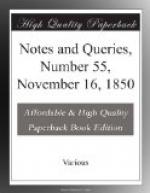“The ring-dial was the hedge-schoolmaster’s next best substitute for a watch. As it is possible that a great number of our readers may never have heard of—much less seen one, we shall in a word or two describe it—nothing indeed could be more simple. It was a bright brass ring, about three quarters of an inch broad, and two inches and a half in diameter. There was a small hole in it, which, when held opposite the sun, admitted the light against the inside of the ring behind. On this were marked the hours and the quarters, and the time was known by observing the hour or the quarter on which the slender ray, that came in from the hole in front, fell.”
J.M.B.
America and Tartary.—
“Un jesuite rencontra en Tartarie une femme huronne qu’il avoit connue au Canada: il conclut de cette etrange aventure, que le continent de l’Amerique se rapproche au nord-ouest du continent de l’Asie, et il devina ainsi l’existence du detroit qui, longtemps apres, a fait la gloire de Bering et de Cook.”—Chateaubriand, Genie du Christianisme, Partie 4., Livre 4., Chap. 1.
Yet, with all deference to the edifying letters of this missionary jesuit, it is difficult to make such distant ends meet. It almost requires a copula like that of the fool, who, to reconcile his lord’s assertion that he had with a single bullet shot a deer in the ear and the hind foot, explained that the deer was scratching his ear at the time with his foot.
Subjoined is one more proof of the communication which once existed between America and the Old World:
Colomb disoit meme avoir vu les
restes des fourneaux de Salomon dans
les mines de Cibao.”—Chateaubriand,
Genie, Notes, &c.
MANLEIUS.
Deck of Cards.—
“The king was slily finger’d
from the deck.”
Henry VI., pt. iii. Act
v. Sc. 1.
It is well known, and properly noted, that a pack of cards was formerly called a deck; but it should be added that the term is still commonly used in Ireland, and from being made use of in the famed song of “De Night before Larry was stretched,”
“De deck being called for dey
play’d,
Till Larry found one of dem cheated,”
it seems likely to be preserved. I may add, that many words and many forms of expression which have gone out of vogue in England, or have become provincial, are still in daily use in Ireland.
J.M.B.
Time when Herodotus wrote.—The following passage appears to me to afford strong evidence, not only that Herodotus did not complete his history till an advanced age, but that he did not begin it. For in lib. i. 5. he writes: “[Greek: ta de ep’ emou en megala, proteron en smikra],” “those cities, which in my time were great, were of old small.” This is certainly such an expression as none but a man advanced in years




